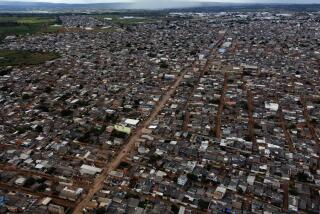Brazil Names New Chief of Central Bank, Lifting Real
- Share via
Brazil unexpectedly named an associate of renowned trader George Soros as its new central bank chief on Tuesday, sending the embattled real soaring 8.4% against the dollar and raising hopes that monetary stability, if not recovery, is on the way.
The appointment of Arminio Fraga, 42-year-old managing director of a New York-based Soros investment fund, reflects the urgency Brazil’s leaders attach to halting the slide of its currency and heading off hyper-inflation and debt default, economists said.
Despite Tuesday’s gain to 1.75 reals to the dollar, the Brazilian currency has lost 30% since Jan. 13 when the government abandoned its costly defense and let the real float freely on world markets. The devaluation has pitched Brazil headlong into economic crisis and fostered the perception that its leaders have lost control of the situation.
Fraga’s first order of business is to stabilize the currency and reverse the outflow of foreign capital, which would instill confidence and set the stage for a drop in interest rates, said Gary Hufbauer, senior fellow at the Institute for International Economics in Washington.
On Monday, Brazil raised its prime interest rate to 39% in a move designed to put a lid on inflation and attract foreign capital. The prime stood at 29.5% three weeks ago. The oppressively high rates, if left untouched, would also cause a deep recession and worsen the country’s debt load.
Brazil’s largest stock market fell Tuesday, with the Bovespa index down 1.8% to 8,731 points.
Fraga’s appointment came as government leaders continued talks in Brasilia with International Monetary Fund officials, including Deputy Managing Director Stanley Fischer. At the top of the agenda: a Brazilian request for early disbursement of $9 billion in IMF funds to shore up its depleted foreign reserves, observers say.
Although Fraga is highly respected, the announcement shocked many observers in Brazil and elsewhere and fed rumors that radical new monetary policy, such as capital controls, could be in the cards. Others took a lighter approach to the latest event in Brazil’s ongoing economic melodrama.
“The appointment means that Brazilians are in denial over one of humanity’s end-of-the-century sicknesses, which is boredom,” said Edmar Bacha, president of BBA Securities in New York and a former head of Brazil’s national development bank.
Fraga, himself a former central bank official, replaces Francisco Lopes, who had held the job only since Jan. 13, when he replaced Gustavo Franco.
“It is not that Lopes was a bad man or following wrong policy, but rather it was a perception that he lacked the skills to operate in this new environment of a new floating currency and the knowledge of the appropriate intervention policies,” said Carlos Kawall, chief economist at Citibank in Sao Paulo.
Lopes had come under increasing fire for his perceived failure to spell out a clear policy. As a result, foreign confidence in Brazil’s ability to manage its way out of the growing crisis was ebbing.
“It’s less a reflection of a need to shift policy than to develop one and develop credibility for one,” said Michael Gavin, economic research director at Warburg Dillon Read in Stamford, Conn., and a former lead research economist at the Inter-American Development Bank.
Especially worrisome for foreign investors was Lopes’ initial attempt at a controlled devaluation of the real Jan. 13 and his subsequent comments that Brazil’s chaotic situation might take six months to resolve itself.
Fraga, with a Princeton doctorate, central bank government service and time spent under the tutelage of Soros, brings impressive credentials to the post, said Desmond Lachman, emerging markets economist at Salomon Smith Barney.
Observers predicted Fraga will try to avoid imposing controls on capital entering and leaving Brazil because it would be a “regressive policy” and would slow, if not stop, the torrent of foreign capital that has flowed into Brazil over the last five years, Lachman said.
“The whole idea of Brazil has been to open the economy up to international investments and trade flows. Capital controls would frighten people away. They will be reluctant to pour money in there if they don’t know whether they can get it out,” Lachman said.
But observers would not rule out capital controls or other measures if Brazil is unable to quickly reestablish confidence in its policies. Some $50 billion has fled the country since early August, leaving about $36 billion as of Tuesday.
“We are talking about a three-month window. Either they turn it around and convince people they are doing things so that capital comes back and interest rates back down, or there will be a new wave of disbelief and possibly an explosion of debt that people believe could only be resolved by a default,” said economist Hufbauer.
(BEGIN TEXT OF INFOBOX / INFOGRAPHIC)
Real Rally
Brazil’s currency, the real, halted its devaluation spiral on Tuesday--at least for the moment--as it rallied to 1.75 per U.S. dollar. Chart shows how many reals a dollar would buy, daily since Jan. 4:
Tuesday: 1.75 reals
Source: Bloomberg News
More to Read
Sign up for Essential California
The most important California stories and recommendations in your inbox every morning.
You may occasionally receive promotional content from the Los Angeles Times.










